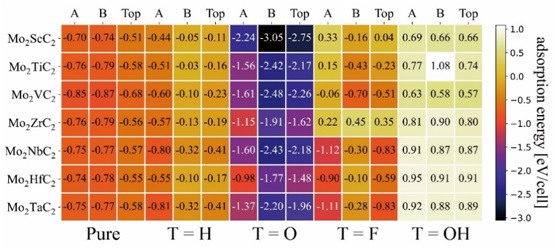| Biography | |
|---|---|
 Prof. Bing Xiao Xi’an Jiaotong University, China |
|
| Title: High-throughput Computational Investigation of the Energy Conversion and Storage Performances of Ordered Double-Transition Metal MXenes: Thermoelectric Power and Lithium Ion Battery | |
| Abstract: MXenes, which are made of transition metal carbides or nitrides, belong to a large family of new type of two-dimensional materials. The ordered double-transition metal MXenes show a diverse crystal structures and chemical compositions, both offering the unique opportunities to tuning their energy conversion or storage properties and performances. In this work, we employed the latest developed highly efficient semi-local density functional SCAN-rVV10 to uncover the thermoelectric properties as well as the lithium ion adsorption and diffusion dynamics in those novel 2D materials. For thermoelectric application, our initial high-throughput calculations systematically screened 1287 MXenes structures with the variations of transition metals and surface functionalization. Among them, 167 MXenes are found to be stable. By further evaluating their Seebeck coefficients, we predicted fewer chromium-based double-transtion metal MXenes (Cr2TiC2,Cr2TiC2F2,Cr2TiC2H2,Cr2TiC2(OH)2) show very high Seebeck coefficients and which are promising thermoelectric materials. Regarding the energy storage application of double-transition metal MXenes, we mainly focused on 35 different Mo-based structures: Mo2MC2 (M = Sc, Ti, V, Zr, Nb, Hf, Ta) and the surface functionalized variations Mo2MC2T2 (T= -H,-O,-F and -OH). Our calculations revealed that the intrinsic MXenes show higher theoretical capacities and better ion diffusion dynamics for the use of them as the anode materials in lithium ion battery. The predicted maximum theoretical capacity of Mo-based MXenes can reach 190 mAh/g. Due to the very low diffusion energy barrier (0.03~0.06 eV), the diffusion coefficient is also extremely high for intrinsic Mo-based MXenes (10-8 m2/s).
The current high-quality high-throughput calculations also enabled us to establish the proper descriptors for the interested properties and to discover the underlying physics correlating the performances of MXenes with a descriptor.
| |
| Biography:
Bing Xiao received the B.Eng. degree from Kunming University of Science and Technology, Kunming China in 2002, M.Eng. degree from Xi’an Jiaotong University, Xi’an China in 2009, and M.S. and Ph.D. degrees in physics from Tulane University, New Orleans USA in 2013 and Temple University, Philadelphia USA in 2014. He did his postdoctoral researches as research associate in the Department of Earth Sciences at University College London, London UK from 2014 to 2017. He joined Xi’an Jiaotong University since Sep 2017. Currently, he is the full professor in School of Electrical Engineering. He published over 100 peer-reviewed journal articles including Proceedings of National Academy of Sciences、Angewandte Chemie、Journal of Physical Chemistry Letters、Acta Materialia、Physical Review B、Carbohydrate Polymers、Materials and Design、Journal of Physical Chemistry C、Journal of Applied Physics. His publications received more than 3700 citations with the H-index 35 in Google Scholar. His current research interests include the understanding and predicting the electron and phonon transport properties in novel 2D materials using density functional theory, materials genome and high throughput computational methods.
| |


